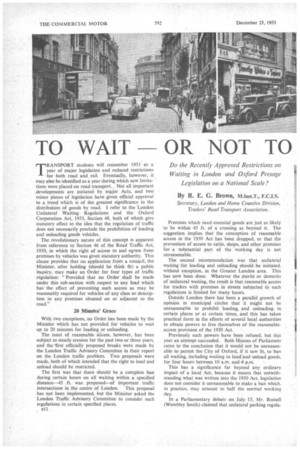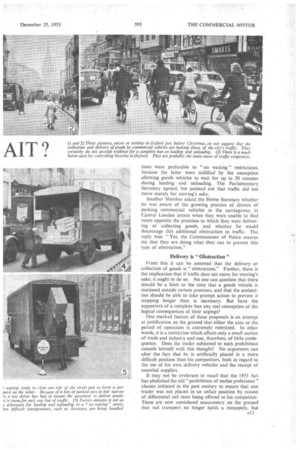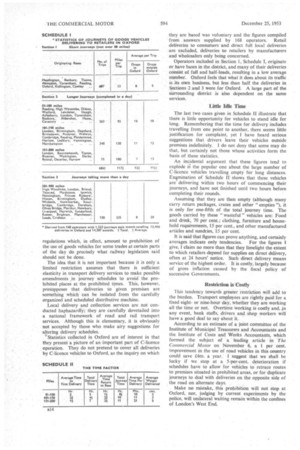TO WAIT OR 1\ OT TO AIT ?
Page 38

Page 39

Page 40

If you've noticed an error in this article please click here to report it so we can fix it.
Do the Recently Approved Restrictions on Waiting in London and Oxford Presage Legislation on a National Scale ?
By R. E. G. Brown, M.Inst.T., F.C.I.S. Secretary, London and Home Counties Division, Traders' Road Transport Association. TRANSPORT students will remember 1953 as a year of major legislation and reduced restrictions for both road and rail. Eventually, however, it may also be identified as a year during which new limitations were placed on road transport. Not all important developments are initiated by major Acts, and two minor pieces of legislation have given official approval to a trend which is of the greatest significance in the distribution of goods by road. I refer to the London Unilateral Waiting . Regulations and the Oxford Corporation Act, 1953, Section 48, both of which give statutory effect to the idea that the regulation of traffic does not necessarily preclude the prohibition of loading and unloading goods vehicles. .
The revolutionary nature of this concept is apparent from reference to Section 46 of the Road Traffic Act, 1930, in which the right of access to and egress from premises by vehicles was given statutory authority. This clause provides that on application from a council, the Minister, after holding (should he think fit) a public inquiry, may make an Order for four types of traffic regulation: "Provided that no Order shall be made under this sub-section with respect to any load which has the effect of preventing such access as may be reasonably required for vehicles of any class or description to any premises situated on or adjacent to the road."
20 Minutes' Grace
With two exceptions, no Order has been made by the Minister which has not provided for vehicles to wait up to 20 minutes for loading or unloading.
The tenet of reasonable access, however, has been subject to steady erosion for the past two or three years, and the "trst officially proposed breaks were made by the London Traffic Advisory Committee in their report on the London traffic problem. Two proposals were made, both of which intended that the right to load and unload should be restricted.
The first was that there' should be a complete ban during certain hours on all waiting within a specified distance-45 ft. was proposed—of important traffic intersections in the centre of London. This proposal has not been implemented, but the Minister asked the London Traffic Advisory Committee to consider such regulations in certain.specified places. Premises which need essential goods are just as likely to be within 45 ft: of a crossing as beyond it. The suggestion implies that the conception of reasonable access in the 1930 Act has been dropped, or that the prevention of access to cafes, shops, and other premises for a 'substantial part of the working day is not unreasonable.
The second recommendation was that unilateral waiting for loading and unloading should-be initiated, without exception, in the Greater London area. This has now been done. Whatever the merits or demerits of unilateral waiting, the result is that reasonable access for traders with premises in streets subjected to such regulations is limited for many hours.
Outside London there has been a parallel growth of opinion in municipal circles that it might not be unreasonable to prohibit loading, and unloading, in certain places or at certain times, and this has taken practical form in the efforts of several local authorities to obtain powers to free themselves of the reasonableaccess provision of the 1930 Act.
Previously such powers have been refused, but this year an attempt succeeded. Both Houses of Parliament came to the conclusion that it would not be unreasonable to permit the City of Oxford, if it saw fit, to ban all waiting, including waiting to load-and unload goods, for four hours between '10 a.m. and 4 p.m.
This has a significance far beyond any ordinary impact of a. local Act, because it means that notwithstanding what was written into the 1930 Act, legislation does not consider it unreasonable to make a ban which, in practice, may amount to half the normal working • day.
Ina Parliamentary debate on July 15, -Mr. RuiseIl (Wembley South) claimed that unilateral parking regula
tions were preferable to "no waiting" restrictions, because the latter were nullified by the exemption allowing goods vehicles to wait for up to 20 minutes during loading and unloading. The Parlialnentary Secretary agreed, but pointed out that traffic did not move merely for moving's sake.
Another Member asked the Home Secretary whether he was aware of the growing practice of drivers of parking commercial vehicles in the carriageway in Central London streets when they were unable to find room opposite the premises to which they were delivering or collecting goods, and whether he would discourage this additional obstruction to traffic. The reply was: "Yes, the Commissioner of Police assures me that they are doing what they can to prevent this type of obstruction."
Delivery is " Obstruction "
From this it can be assumed that the delivery or collection of goods is "obstruction." Further, there is the implication that if traffic does not move for moving's sake, it ought to do so. No one can question that there should be a limit to the time that a gobds vehicle is stationed outside certain premises, and that the authorities should be able to take prompt action to prevent it stopping longer than is necessary. But have the supporters of a complete ban any real conception of the logical consequences of their urgings?
One marked feature of these proposals is an attempt at justification on the ground that either the area or the period of operation is extremely restricted. In other words, it is a restriction which affects only a small section of trade and industry and one, therefore, of little con§equence. Does the trader subjected to such prohibition console himself with this thought? No arguments can alter the fact that he is artificially placed in a more difficult position than his competitors, both in regard to the use of his own delivery vehicles and the receipt of essential. supplies.
It may not be irrelevant to recall that the 1953 Act has abolished the old "prohibition of undue preference" clauses initiated in the past century to ensure that one trader was not placed in an unfair position by reason of differential rail rates being offered to his competitor. These are now considered unnecessary on the ground that rail transport no longer holds a monopoly, but regulations which, in effect, amount to prohibition of the use of goods vehicles for some trades at certain parts of the day do precisely what railway legislation said should not be done.
The idea that it is not important because it is only a limited restriction assumes that there is sufficient elasticity in transport delivery services to make possible amendments in journey schedules to avoid the prohibited places at the prohibited times. This, however, presupposes that deliveries to given premises are something which can be isolated from the carefully organized and scheduled distributive machine.
Local delivery and collection services are not conducted haphazardly; they are carefully dovetailed into a national framework of road and rail transport services. Although this is elementary, it is obviously not accepted by those who make airy suggestions for altering delivery schedules.
Statistics collected in Oxford are of interest in that they present a picture of an important part of C-licence operation. They do not pretend to cover all deliveries by C-licence vehicles to Oxford, as the inquiry on which they are based was voluntary and the figures compiled from answers supplied by 168 operators. Retail deliveries to consumers and direct full local deliveries are excluded, deliveries to retailers by manufacturers and Wholesalers only being concerned.
Operators included in Section 1, Schedule I, originate or have bases in the district, and many of their deliveries consist of full and half-loads, resulting in a low average number. Oxford feels that what it does about its traffic is its own business, but less than half the deliveries in Sections 2 and 3 were for Oxford. A large part of the surrounding district is also dependent on the same services.
Little Idle Tune The last two cases given in Schedule II illustrate that there is little opportunity for vehicles to stand idle for long. Remembering that the time for delivery includes travelling from one point to another, there seems little justification for complaint, yet I have heard serious suggestions that drivers leave their vehicles outside premises indefinitely. I do not deny that some may do that, but certainly not those whose activities form the basis of these statistics.
An incidental argument that these figures tend to explode is the popular one about the large number of C-licence vehicles travelling empty for long distances. Eximination of Schedule II shows that these vehicles are delivering within two hours of commencing their journeys, and have not finished until two hours before completing their rounds.
Assuming that they are then empty (although many carry return packages, crates and other "empties "), it is only for one-fifth of the total journey time. The goods carried by these " wasteful " vehicles are: Food and drink, 70 per cent.; clothing, furniture and household requirements, 15 per cent„ and other manufactured articles and sundries, 15 per cent.
It is said that figures can prove anything, and certainly averages indicate only tendencies. For the figures give, I claim no more than that they limelight the extent to which retailers depend for supplies on direct delivery, often at 24 hours' notice. Such direct delivery means service of the highest order. It is costly, largely because of gross inflation caused by the fiscal policy of successive Governments.
Restriction is Costly This tendency towards greater restriction will add to the burden. Transport employees are rightly paid for a fixed eightor nine-hour day, whether they are working all the time or not. Overtime working is costly and, In any event, bank staffs, drivers and shop workers will have a good deal to say about it.
According to an estimate of a joint committee of the Institute of Municipal Treasurers and Accountants and the Institute of Costs and Works Accountants, which formed the subject of a leading article in The Commercial Motor on November 6, a 1 per cent. improvement in the use of road vehicles in this country could save E4m. a year. I suggest that we shall be lucky if we stop at a 5-per-cent, deterioration if schedules have to allow for vehicles to retrace routes to premises situated in prohibited areas, or for duplicate journeys to deal with deliveries on the opposite side of the road on alternate days.
Make no mistake, this prohibition will not stop at Oxford, nor, judging by current experiments by the police, will unilateral waiting remain within the confines of London's West End.












































































